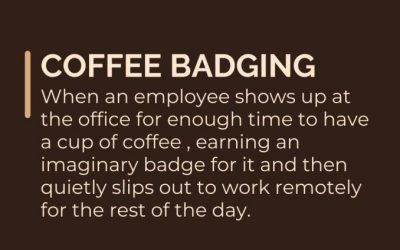We recently reported on a study that was undertaken by London’s Chartered Management Institute, that showed the impact that management and leadership has on an individual’s health and well-being. The impact that technology is having on Managers was a prominent theme throughout the results of the study. The study also demonstrated that long working hours are having a significant adverse effect on Managers’ health and well-being; and the implications of poor management strategy became prevalent. Here we recommend ways that you can improve the well-being of your Managers and help them to manage the pressures of the role more effectively.
Empower Staff and Encourage Productivity
The study found that the biggest factor that influences motivation a positive well-being is a manager’s ability to decide how they will get their jobs done and complete tasks and projects, with a staggering 74% of respondents stating that this is the most contributing factor to job satisfaction. Give your staff autonomy – structure job position to allow a degree of autonomy and allow your managers to set their own goals with good reason. Self-chosen goals create intrinsic motivation – the desire to achieve goals for their own sake. It creates a higher level of determination and persistence and will enhance engagement levels. Empower your staff through rewarding and recognition of their achievements and support personal and professional development.
Switch Off
Allow employees to switch off from work emails during non-working hours. Duties should be kept to working hours if you want to maximise the productivity levels of your staff. It is a clear indicator, with 61% of respondents claiming that technology makes it hard for them to switch off, that this is an issue that needs to be reviewed by employers. You may want to review your communication policy to reduce the likelihood of managers resisting to the temptation of accessing emails out of work. 39% believe that out-of-hours remote access to emails should be restricted by their employers – this may be a wise move in a bid to reduce stress, heighten productivity and increase job satisfaction.
Develop Better Line Managers
You need to develop line managers who have a capability to encourage and engage. Providing feedback to managers on what areas they perform well in and what areas could benefit from improvement will greatly enhance a manager’s quality of working life. Ensure that managers seek feedback on how their management styles are perceived by colleagues. Providing development opportunities to help managers to reflect on their own styles will enable them to develop and enhance their own management styles. Creating more opportunities to learn will always greatly benefit employees. Supporting this, 92% of Chartered Managers say that becoming chartered increased their self-awareness.
Improve Change Management
Managers’ assessment of how senior leaders are managing change is at a low point. A high number of managers are saying change initiatives are failing to deliver business benefits. With change becoming commonplace across most organisations, addressing this should be a priority. During a culture change, strong leadership is necessary, along with improved communication and a level of trust between leaders and managers. It is vital to measure and monitor the impact that change within the organisation is having on managers.
Make Well-being a Focus
With Managers’ time being taken over by long working hours and heavy workloads, time to focus on exercise and personal health is compromised. Implementing a wellness plan for all employees may be beneficial in order to contribute towards eliminating negativity and improving Managers’ health and well-being. Emphasise the impact of poor health and well-being to Managers, and the cost implications it can have to the business in order to get 100% buy in to your wellness plan. Improving well-being means tackling any stigmas that may be attached to the discussion of health. These may be issues regarding mental health, physical illness or stress. Providing information and encouraging discussion about these issues give your staff the confidence to seek if and when needed, help for their health.
Ann Francke, Chief Executive CMI commented on the results of the study:
“There is nothing wrong with hard graft, but only if you’re well supported. Accidental managers who lack the professional skills to deal with the causes of burnout are a threat to their health and others health at work. Productivity will also continue to suffer unless employer’s train their managers.”
If you are struggling to manage the health and well-being of your staff and need a HR professional to join your team, then please call us on 0207 788 6600 and one of our expert consultants will be on hand to help you find the right candidate.











